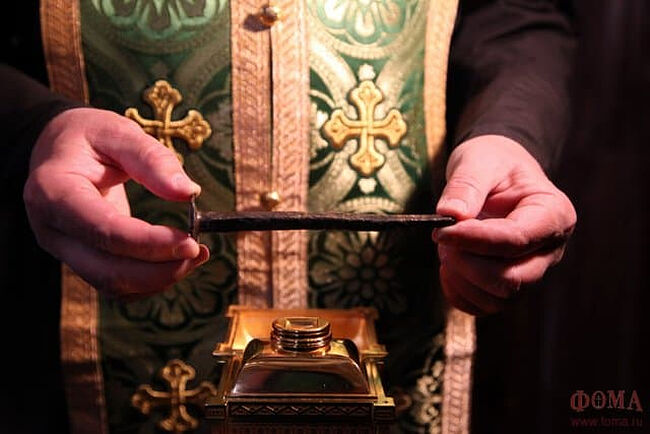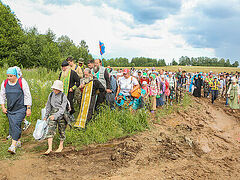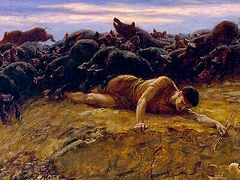This classic treatise by the modern Russian saint, Seraphim (Zvezdinsky), is a must read… and reread!
In ancient times, the eastern despots, especially in Persia, had two terrible, disgusting forms of punishment.
One was that a decomposing corpse was tied to the one being punished, and the corpse’s arms were tightly wrapped around his neck. The sunken eyes of the dead man constantly gazed into his eyes, and he always smelled the stench of the decomposing body; he went about with this terrible burden on his shoulders; he sat down with the corpse; he couldn’t go to sleep without feeling its terrible embrace.
The other punishment was that the convicted man was placed naked on a board with his hands and feet bound tightly to it; then they placed a rat on his stomach, covered it with a clay pot, and a hot iron was placed on the pot. The pot would heat up, and the rat would begin to gasp from thirst, and not finding a way out, it would gnaw the stomach of the man being punished, climb into his insides, and cause terrible pain.
My friends, in our age of culture and civilization, in this age of great discoveries, both punishments have been preserved. Many of us are carrying a terrible corpse on our backs, this dead man of our times—godlessness. It’s also that rat that gnaws at our insides; and people go about with these terrible burdens, because the terrible executioner—the devil—is preparing punishment for them. Oh, what a loathsome, unbearably horrible torture!
If, my friends, you went to the cemetery, and all those buried there would rise up from their graves and surround you, and would wander as pale shadows around you, would your heart not tremble? Wouldn’t you want to run away from this sight? But we often walk among the living dead. Aren’t the unbelievers dead? But we have to look into their souls—aren’t they also dead? Do not the words of the Revelation of St. John the Theologian apply to us: “You think that you are rich, but I tell you that you are poor and wretched and dead” (cf. Rev. 3:17).
So it sometimes seems to us that we’re alive, but in fact our souls are dead from sins, because sin slays the spirit of God within us. That’s why we must all cry out: “Risen Jesus, raise up our souls!”
The holy Apostle Paul says in the Epistle to the Galatians:
But God forbid that I should glory, save in the Cross of our Lord Jesus Christ, by Whom the world is crucified unto me, and I unto the world (Gal. 6:14).
Every Christian must be crucified to the world, be crucified on the cross. He also has nails—four nails, with which he’s nailed to the cross; there’s also a spear with which his heart is pierced.
What kind of cross does a Christian have?
This cross is called renunciation of the world.
The world must be rejected—not the world in which the bright sun shines, not the one in which beautiful flowers bloom—no, through this world we can only know and glorify the Creator.
We must distance ourselves from the other world, from the one that the Apostle John calls an adulterous and sinful world (Mk. 8:38).
This world moves on an infernal chariot of three wheels, which the holy Apostle also speaks about.
These wheels are the lust of the flesh, and the lust of the eyes, and the pride of life (1 Jn. 2:16). With these three wheels, the chariot of the world heads directly into the abyss of hell, into the kingdom of satan.
The first wheel is the lust of the flesh: Those who live in impurity, who break the bonds of marriage (and this happens quite often in our times, to our great sorrow), who promised to preserve virginity and then violated it, are those who are carried away by the first wheel of this terrible chariot.
The second wheel is the lust of the eyes. This is when we sin with our eyes, when we violate the purity of our souls with our eyes. For example, when we admire the beauty of another, not glorifying God, but gratifying ourselves with impure thoughts and desires. All sorts of spectacles that act on the passionate side of the soul are also considered the lust of the eyes. The doors of the theaters ought to have the inscription: “The lust of the eyes.” When we admire dancing, we follow after this wheel.
The pride of life is when a man wants to do everything himself, everything his own way, and he’s annoyed when others object: “How could they not listen to me? Am I wrong? Impossible!” We often, very often grab ahold of this third wheel.
This is the chariot driving the adulterous and sinful world.
And when a man follows the path of renouncing the world, this chariot of hell will certainly come out to meet him, to tempt him, to force him to follow after it; it will cut across his path to stop him. The chariot is headed in one direction, and the man who has renounced the world in another. And every Christian must necessarily be crucified on the cross of renunciation of the world; it’s not only monastics who renounce the world, but everyone who bears the name of Christian, for they cannot love the world, nor those who are in the world.
Christians also have four nails that nail them to the cross.
The first is self-denial.
This nail pierces the right hand, because it’s precisely our right hand that mainly creates and works. It’s an image of the active principle, and it’s nailed by the nail of self-renunciation.
What does it mean to renounce ourselves? To not pay attention, to not take notice of ourselves; if they berate you—don’t get upset; if they praise you—don’t rejoice, as if they’re talking about someone else.
The second nail is patience, which nails the left hand, because the left hand is considered a symbol of the evil inclination and protest.
The Christian’s right foot is nailed to the cross by the nail of prayerful vigil, endurance in prayer. Pray without ceasing, says the word of God (1 Thess. 5:17). It’s necessary that even when the body is sleeping, when it’s resting, the soul should be vigilant, praying.
The fourth nail, which pierces the Christian’s left foot, is the work of prayer.
It’s not correct to say that prayer is easy, that prayer is a joy. No, prayer is a labor. The Holy Fathers say that when a man prays easily, with joy, it’s not him praying himself, but an angel of God praying with him, and it’s good for him. When prayer doesn’t go well, when you’re tired and you want to sleep, when you don’t want to pray, but you pray all the same, that’s when your prayer is dear to God, because you yourself are praying, laboring for God, and He sees this labor and rejoices in your effort, in this work for Him.
Many say: “I didn’t pray this morning. I wasn’t in the mood.” Only an uneducated Christian could speak like that. When you’re not in the mood, then go to church and stand in prayer, so your feet would be as if nailed to the cross. A crucified man can’t go anywhere, so let your feet be nailed by standing in prayer and prayerful labor.
There’s always a crown of thorns resting upon the head of a Christian—this is our thoughts. They constantly make themselves known to a Christian; they painfully pierce us, like a thorn. A man stands in prayer, and his thoughts spring up and perturb him in the church; even before the Life-Giving chalice, these thoughts bother us, and they’re often terrible; they frighten a man, and he must uproot them. This is painful.
The spear that pierces the heart of a Christian is love for Christ. Whoever has this love always sees the Sweetest Lord before him; whoever has this love always hears in his soul: “Lord Jesus Christ, Son of God, have mercy on me.” Such a man has no time to think about the world, about the mundane—his mind is ever occupied with the image of his Savior; he has no time to judge others, to analyze their actions—he judges only himself so as not to offend His beloved Lord.
St. Ignatius the God-Bearer had such love. He exclaimed: “Oh, my love…”
I pray to God that none of you will get on the chariot of the world, that not a single wheel would touch you, that you would ever be nailed to the cross, bearing the wounds of the Savior.
Lord, Jesus Christ, we pray Thee, grant us to be co-crucified and co-buried with Thee, that we might be resurrected unto eternal life with Thee...
Our soul can die and become food for worms. The worms that torment our souls are our passions and sins; there are infinitely many of these worms in our souls, because we have many, many sins—in word, and deed, and thought—we sin in all these ways.
As the Psalmist says: Mine iniquities are gone over mine head (Ps. 37:5)—how many sins we have!





